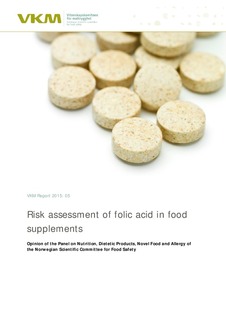Risk assessment of folic acid in food supplements. Scientific opinion of the Panel on Nutrition, Dietetic Products, Novel Food and Allergy
Haugen, Margaretha; Frølich, Wenche; Strand, Tor A; Tell, Grethe S.; Frøyland, Livar; Holven, Kirsten Bjørklund; Holvik, Kristin; Løvik, Martinus; Meltzer, Helle Margrete; Iversen, Per Ole
Research report
Published version
Permanent lenke
http://hdl.handle.net/11250/2463963Utgivelsesdato
2015Metadata
Vis full innførselSamlinger
Sammendrag
The Norwegian Scientific Committee for Food Safety (VKM) received a request from the Norwegian Food Safety Authority to assess whether the Tolerable Upper Intake Level (UL) of folic acid should be amended in light of new scientific evidence suggesting a possible link between high intake levels of folic acid and risk of cancer. Folic acid obtained from both food supplements and fortified foods should be assessed. Folic acid is a synthetic form of folate and is commonly used in food supplements and in food fortification because of its stability and bioavailability. Folic acid is reduced, methylated and released into the circulation. Natural folates occur in reduced forms, e.g. as tetrahydrofolate (THF), which are unstable and may thus loose biochemical activity during harvesting, storage, processing, and preparation.
